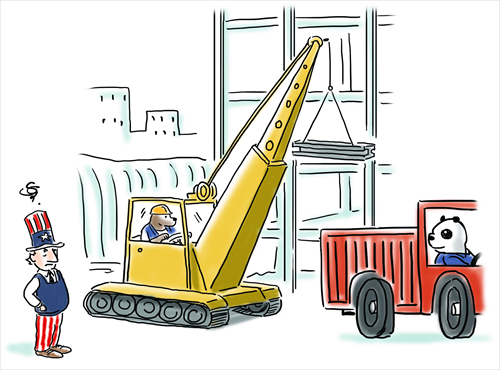Russian cooperation with China is tactical, not strategic

Illustration: Liu Rui/GT
During Russian President Vladimir Putin's just concluded state visit to China, a series of massive deals were sealed between the two sides and Sino-Russian strategic mutual trust has been hailed and consolidated. Apart from that, in the joint statement signed by Chinese President Xi Jinping and Putin, both countries voiced their concern over an increasing number of "negative factors" affecting global strategic stability without mentioning names. The two major powers are showing a clear intention to join hands in counterbalancing the US.
China is a realistic country, and it is aware of the power of leverage. In the early 1970s, Beijing developed a close relationship with Washington to respond to Moscow's military threat. The two later cooperated on strategic defense, and the US served as a source of advanced technology and equipment for China's military.
At that time, even though the White House maintained a "diplomatic relationship" with Taiwan, China still tried to seek US help to counter the pressure from the former Soviet Union. Today, against the backdrop of the accelerating US rebalance to the Asia-Pacific strategy, which aims at containing the rise of China, we have no reason to refuse the use of realistic measures for our own interests, including counterbalancing the US-Japan alliance through cooperation with Russia. China's wisdom since ancient times will not be lost in the current era.
Such wisdom is shared by all members in the international community, including Russia. Moscow is now using the same strategy to maintain its own national interests. If there is a way that can help it resist the threat from the US while preserving a certain degree of mutually beneficial collaboration with Washington, cooperation with Beijing is the way forward.
Some Russian media have claimed that after Russia announced the "turn to the East" strategy in 2010, no solid progress has been made so far. The country's joint work with China is more of a grand vision rather than actual improvements in projects. Indeed, the Kremlin's "turn to the East" is only a contingency plan, which was basically put into effect under pressure. In the light of this, Russia's collaboration with China is more a matter of expediency, instead of a "strategy."
Russia's heart is always with the West. Its biggest hope is to earn the respect from the West and integrate into the Western hemisphere. This is the mainstream value among Russian elite. If the next US president shows more respect to Russia and is less tough toward Moscow, the Kremlin's "turn to the East" will very likely swing to the West.
Recently, Putin initiated the establishment of a Greater Eurasian partnership on the basis of the Eurasian Economic Union (EEU). The goal of his proposal is to integrate resources in its neighborhood while preventing the West from further expanding to the east.
In the meantime, Russia is also on guard against China. Even though such broad partnership has a place for Beijing, this is an outcome of bilateral compromise. Beijing is concerned about the EEU's negative impact on China's westward development, while Moscow is worried over China's growing influence in its peripheral countries via the "Belt and Road" initiative.
That's why we now see the programs from the two sides are connected to each other. This is a structure of balance as well as a result of give-and-take.
No matter what the Sino-Russian bilateral relationship is going through for the moment, be it big deals, Russia's "turn to the East" strategy or the Greater Eurasian partnership, none of them are long-term strategies, but only tactical cooperation.
Due to the different core values of the two sides, cooperation between Beijing and Moscow is mostly aimed at third parties. Yet history has proven numerous times that any collaboration based on considerations aimed at a third party will be bound to change with the times.
A crucial challenge that China-Russia ties are now confronting is how to transform their joint work based on realism into a foundation of long-term bilateral cooperation.
The author is deputy dean of the Institute of International Studies at Fudan University. opinion@globaltimes.com.cn